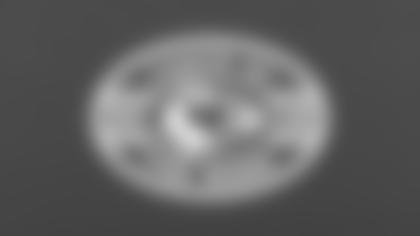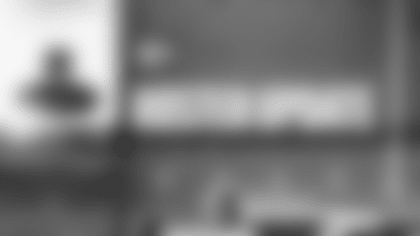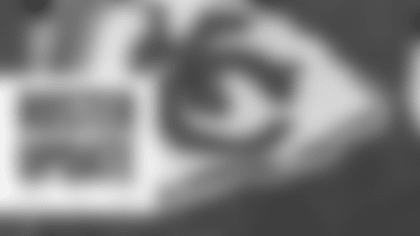Offensive coordinator Doug Pederson
**
Q:On Alex Smith's passing attempt streak. **PEDERSON: "It's tough to do in this league and all of the different defenses and disguises you're seeing in the secondary now a days and fire zone blitzes and guys are coming from all over the place. So for him to be able to take care of the football like he does is a tremendous feat. He studies so hard during the week, too. He knows our offense, he knows where to go with the football even during blitzes and even if they don't blitz and they play man or zone. So he's very well-rehearsed when it comes to that and he's got a knack for either throwing it away or using his legs to run and that's been helpful with him, too, with the lack of interceptions."
Q: Do you also have to be lucky?
PEDERSON: "A little bit. He's got great vision, too and he sees the field well. And yeah, sure, you have to have luck. You can't have a lot of tipped passes and things like that at the line of scrimmage because those can turn into turnovers for you, but a little bit of luck on your side helps you a little bit, yeah."
Q: Do you think Travis Kelce's fumble affected his performance?
PEDERSON: "You know what, it doesn't because it's one play. That's been our focus all year. When that happened before the half – one thing, as a coordinator, I feel like it's part of my job to go to him and say 'listen, we're going to keep coming to you. It's not like we're not going to come to you, you're one of our leaders.' And you saw on that third down play and then the two point conversion the trust that Alex (Smith) has with him. So one play doesn't define you either way and with him he's going to give you a handful of those and you know. But yet, it's not going to discourage you from continuing to throw him the football."
Q: So is that just a part of the same mentality in him?
PEDERSON: "Exactly – exactly. And you're going to take the good with the bad and that's with any player you have. With him there's so much good and upside that one play doesn't define you and he shakes it off. He's mad, we're all kind of frustrated at the time, but we're still going to go to him and give him the football as much as we can later on in the game."
Q: So are you just going to have to accept an occasional fumble from him?
PEDERSON: "Well, it happens with anybody that touches the ball as much as he does. And it could go back to the quarterback position, he touches the ball every time – the running back position, anybody that handles the football there's always that possibility. And you also know going into the game, especially that game, the Raiders and (Charles) Woodson are ball hawk guys – they're strippers, they're going to go rip the ball out and you see it on tape. So you kind of have to know that going into the game as well and just protect against it."
Q: What does Travis Kelce have to do to have better ball security?
PEDERSON: "Oh, it's the same old thing, it's high and tight, it's the ball leverage in his arm – he's got to be aware that they strip the ball and you've got to know the game situation in that moment of the game. And a lot of times that's where you see the fumble. There's the occasional – they're just going to tackle and hit the ball, which happens, which is kind of a freak deal. But it's those that try to go in and pull it out are the times that you really have to protect it. You see Spencer (Ware) and the running backs kind of go with two hands over the top when they're going through the line of scrimmage, so just being aware of that and understanding what the defense is trying to do."
Q: Would you have preferred Travis Kelce to have gone out of bounds?
PEDERSON: "Well, in that situation we were in a two minute drill and you'd love for him to get out of bounds since he already got the first down. But again, he's aggressive and he wants to get as much out of the play as he could, but it's just unfortunate."
Q: Are you surprised by all of the success the offense has had considering the offensive line situation this year?
PEDERSON: "It's pretty amazing, isn't it? Especially in the National Football League. And again, give credit to Coach (Andy) Heck and Eugene Chung and the guys up front for kind of just grinding this thing out with the adversity that they've been faced with. I think it's just been a one-game mentality with us. We were at one point, probably the lowest of the low when we were sitting at 1-5 and the only way to dig out of that hole is one game. And it really didn't matter at the time who was playing – running back by committee, the offensive line is getting shuffled around, moving receivers around a little bit. So the guys have really embraced that well and it's really a tribute to the guys that are playing that they're not going to let a couple little things worry them or get in the way of where they want to go."
Q: Does the inexperience of some offensive lineman affect your thinking or do you just keep going forward?
PEDERSON: "Just keep going forward. They're so well coached, they get a ton of reps during the week. Zach (Fulton) has played center in preseason games before. He has a little experience there and I think just his awareness and understanding of what we're trying to get done and keeping the game plan. It also sort of falls back on me as a coordinator and coach that we've got to keep the game plan relatively simple for them where there's not a lot of checks and calls for those guys and just let them go play and you don't worry about whose out there."
Q: How often does Andy Reid let you take over play calling when he gets in a slump?
PEDERSON: "It's not very often, but there's been times this year that he's allowed me to do that. And I think he and I are so well connected and as is the offensive staff, he has that trust and confidence that he can do that. And I know that with him, too, it's a way to kind of view the game without having to call the play for a series or too and then he gets right back on it. But he's one of the best play callers in the National Football League and he's not in slumps very often."
Q: On how Andy Reid determines when to turn over or take over the play calling.
PEDERSON: "It's a little of both, but I would say that sometimes it's more of a change up. If you get into the course of the game and you feel like maybe the defensive coordinator has a beat on you, that you just change up. Whether you're moving the ball or not and you get it from a different set of eyes and he's given the faith and trust in me to do that and we get a lot of input throughout the game anyway, and it's just sometimes a change of pace for a defensive coordinator."
Q: Are you offering suggestions when he's calling plays?
PEDERSON: "Usually when we're on offense there's not a lot of communication that way. But between series on the sideline or from the guys upstairs there's dialogue going on that certain plays can kind of get lost on your play sheet and you're reminded that 'hey, this might be pretty good in this situation.' And a lot of it, too, is predicated on how the defense is playing at that particular time and how they're scheming you up in certain personnel groups and formations. And then we get ideas and suggestions and put another series together for the next drive."
Q: Do you ever tell Andy Reid that it's not working for him from time to time?
PEDERSON: "No, I just wait for that tap on the shoulder. But no, I don't do that."
Special teams coordinator Dave Toub
Q: What happened on the PAT?
TOUB: "Well, snaps were good. Dustin (Colquitt), on a rare occasion, had the ball and the bottom of the ball slipped out on him. Then when Cairo (Santos) came to kick it, the ball was on an angle and he aborted the kick. In a perfect world, the ball was still down and we want him to still try to kick that thing. Going forward, that's what we'll do. The next one, Cairo missed it. He just missed it right, he didn't follow through. That's what happened. You could see it on tape, it was as clear as day."
Q: How much was the second miss caused by the first one?
TOUB: "Could be a little bit. You doubt a little bit about, 'Is the ball down? Is it perfect?' Hopefully we move on from that. Fortunately, our other guys came through, the team came through and it didn't cost us the game. With those kind of situations, we have to have that done right."
Q: Was there something about the turf that contributed to the misses since Janikowski missed one too?
TOUB: "No, the turf was fine, the weather was good. There was really no excuses, really, for it. I can't speak for (Sebastian) Janikowski, but people miss sometimes. Late in the year, I think you're going to see that more and more. The games are just so much more important at the end of the year and the weather, all those things are going to come, too."
Q: Did you see that in all the games last week?
TOUB: "Yeah, I think so. I think that's all part of it. I think the magnitude of every game is more important and the weather, those things and just the pure pressure."
Q: What have you seen from Chris Conley?
TOUB: "He really had a nice game – that was his best game, obviously. He beat the single gunner on that one play and went down. That's a hard tackle to make in open field and he timed it up perfect. It was good to see him make that play because that's the next step for him. He's been down there a bunch and forced fair catches and one time missed a tackle, but this time, made the play. He's getting better and better. He's improving every week."
Q: And then when he faced those double blocks, did it seem like he was going to give up?
TOUB: "No, no. That's tough duty. They doubled him after that play for the rest of the game and he was battling in there. Sometimes, they get the best of you and sometimes you win, but he doesn't quit. He's a tough guy. He's a good player."
Q: What type of growth have you seen from D.J. Alexander from training camp?
TOUB: "D.J., right now, he's still our leading tackler. He flies. You watch tape and he just jumps out at you on tape. I mean, he's on the back side of a kickoff and he's making tackles and he's in on plays on the left side. He gets mad when the play doesn't come to his way. He can fly around the field and he's definitely somebody other teams have to contend with."
Q: What do you want the players to take away from the special teams plays in Oakland?
TOUB: "Operation on field goal. Get that corrected. I like our coverage for now, and the return game is coming around a little bit, having Knile (Davis) back in there and Frankie (Hammond) gets more and more. He's going to build his confidence week-to-week and he had a nice return in the game. We've just got to keep getting better and improving and finish strong here down the stretch."
Defensive coordinator Bob Sutton
Q: Is Derrick Johnson proving that you can get better throughout the season, even at his age?
SUTTON: "Yeah, I think so. I think there's a lot of things that have happened this year. One, he did a great job of coming off of a major injury. He trained really hard and prepared really hard. I don't think he's lost a lot of his skillset, so that's huge. And then I think he probably has a better understanding of exactly what we're doing. I think one of the things that these guys have done a great job of is really working together, studying and really zeroing in on what a team is doing. When you have a good feeling about what the opponent is doing. It allows you to play a little faster. Like I've said before, defenses really knowing where your help is at. So it tells you how you can play, when you can take a chance, et cetera. I think he understands that. He's always had the ability to kind of dart and slice into the line of scrimmage – since he was in college, he could do that, so that's a natural thing for him. I think he really understands what we're doing, he's done a great job of studying the opponents and Gary Gibbs has done a great job with him. So those are all things that help you play and perform at a high level. He did a great job, obviously, last week."
Q: On going to more blitzes at halftime against Oakland to create more pressure:
SUTTON: "I think there was a lot of things that happened that game. We obviously didn't start very well that first series. Most drives, as we always try to show our defense, things happen in a drive. Usually explosive plays – scoring drives – and, or penalties occur. So we had the 35-yard run in that first drive and I think after that drive, we settled in and we were playing really well for about three or four series. Then what we didn't do is a good job of, right before half, with the sudden change situation. We needed to force a field goal there and didn't do it. And then came back in the second half, didn't start as good as we needed to, and then we started playing. A lot of it gets you into a rhythm when you can do things on defense. When you get them behind the chains a little bit when you can pressure. I thought the guys did a really good job of adjusting during the game. It was a hard-fought game, they played, I thought, really well. We were fortunate to makes some plays there to help turn the tide."
Q: Did the sacks and turnovers come in bunches in the second half?
SUTTON: "Again, we've put a lot in to improving the ability to take the ball away. From emphasis, to thinking about it, to all those things, the players have done a really good job – and start with in practice, taking advantage of your opportunities. I think those are huge parts of it. I don't know how they come, but I'm glad they did, because it worked out well for us."
Q: What are your thoughts on what Eric Berry has accomplished this year?
SUTTON: "I think EB has had a great year. Since the time I came with Coach Reid, I think it's the best football he's played. He's made some unbelievable plays. He made a play two weeks ago on that screen that's probably as good a play as you're going to see. He went underneath the lineman, popped up, made the play and did it. He's made a couple plays on short-yardage, coming in there. He's really given us a lot of range back there, he covers a lot of ground. One of the things on defense that speed does, it isn't only the plays you make, it's the plays you prevent. And that's one of the things he's done a great job of. I think he's playing outstanding football. As we've talked in the past, a year ago, he didn't get to practice, he didn't practice at training camp, he hurt the ankle the second game and obviously, he had to deal with the major illness. He's just coming back to, I think, to where he really can. But I think he's done a fabulous job. I'm excited for him, it's really thrilling just to watch."
Q: What is it about Philip Rivers that makes this a team you can't count out?
SUTTON: "Well, because Philip Rivers, to me, his greatest quality through this year, number one, playing at an extremely high level himself. Two, I don't think he even blinks an eye and worries about who's playing with him. He's attacking you full-fledged, there's no holds barred, there's nothing being saved and he's done a great job. He's been smart with the ball, he's a high-percentage passer, his quarterback rating, I think, is still right over 100. I think he's done a great job, considering all the injuries they've had around him. Their offense, for the most part, has been pretty good. When you deal with him, you better be ready to play the entire game. It's just the way he is, he's ultracompetitive. And like I say, he doesn't blink, he's tough-minded, he'll sit in that pocket, he doesn't care. You have to come to work when you play a guy like him."
Q: Is taking Rivers' weapons out of the game a key this weekend like you did in the first game with Gates, Woodhead and Green?
SUTTON: "Well I think it always is. We always know that those guys that you mentioned are particularly tough matchups on all teams because of their skillsets. And you have to deal with them, even when they have their full complement of wide outs. (They're) still tough matches. You have to do things to help take them away. The biggest thing is you have to, as a defense, you have to always know where these players are. Sometimes it isn't changing a coverage, but you know where they are, you have presence on them, you know the things they like to do, and you have to be ready to react and defend those things. It might not be a double cover or something like that, it's just playing your defense out and being aware of where these players are."
Q: How effective do you think the communication has been between your secondary?
SUTTON: "I think they've done a great job. We've had a lot of different people go in and out of there and they've done a nice job. Through injuries, we've had several different groups of players. But overall, they've been really good. And it's always challenging here because it works in reverse for us because it's noisy here, it's hard on the offense, it's hard on the defense, too, because the noise is so high."













